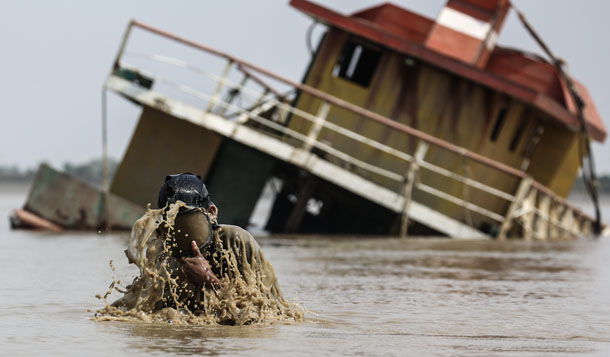RANGOON — When the tide of the Bago River goes out, they jump on a wooden boat and head to the middle of the river to start their job. With the low tide, part of the cockpit of a sunken barge has become visible on the water.
“We have to make the most of the low tide, if not it will be very difficult for us because the whole boat will be underwater,” one of the men told me.
There are six people onboard. They all are professional divers who have long made their living salvaging sunken boats and ships in the Bago and Rangoon rivers, which run around Burma’s largest city.
They leave the boat’s engine idling near the sunken vessel, a sand barge that sunk one month ago. They are here today to retrieve the wreckage. Their gear is not sophisticated: a few flimsy masks, oxygen tanks, an air compressor, pumps and a few large empty drums.
“First, the divers have to attach the empty drums to the side of the wreckage. They play a vital role in the salvaging process,” the crew leader explains. After attaching the drums, the divers go down into the wreckage to pump out silt that has deposited inside the sunken barge.
“By the time the tide is high, we pump air into the drums. When the drums are filled with air, the wreckage floats on the water,” the leader said.
Most of the crew earns the equivalent of about US$10 a day. But they all admit that they job is dangerous since they are at risk of suffocating if the oxygen supply onboard goes wrong, or if they get stuck in the wreckage.
“Though our job is risky, we have no choice as we can’t do any other job,” one diver said.

















